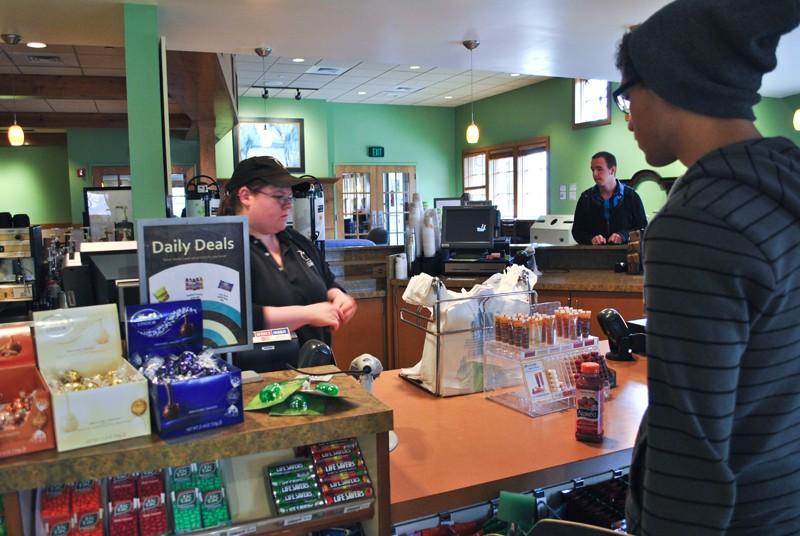Despite growth, students face tough job market

GVL / Allison Young An employee works in the C Store at the Kliener Commons
Apr 2, 2012
It’s no surprise that students and recent college graduates have been feeling a lot of pain in the sluggish economy, but even as unemployment rates decrease, students should still expect to become more adaptable and flexible in their career plans.
“People who are smart, challenged and get involved are getting a good education on how to make things work, and if we do grow they will be ahead of the game,” said Timothy Fisher, assistant chair of the department of art and design at Grand Valley State University. “In the long term this experience is not great for anybody, I think as it develops people will have different skills. It does take strong creative minds to stay ahead of the game and it is going to be on pace with everyone.”
He said many of the art students have to participate in extra events to supplement their income.
“Many of our students are getting jobs but they often have to start off in the non-arts,” Fisher said. “It’s tough and still very competitive and I think that is the same for almost every field you look at.”
Katie Golicz, a GVSU sophomore majoring in international business, said all fields are going to have trouble in the job market unless students are aiming for jobs that are in high demand, such as business, medicine or technology.
“It will still be difficult because the economy is bad all around,” Golicz said. “We all import and export goods between countries and we are all intertwined so if one economy goes down they all go down.”
While the economy has begun to rebound, with unemployment dropping from 9 percent to 8.3 percent as the U.S. has added 200,000 jobs each month in 2012, a slow economic growth rate of 3 percent has created what Federal Reserve Chairman Ben Bernanke called a “puzzle” in an interview with CNN.
Daniel Giedman, an economics professor at GVSU, said the discrepancy between the number of new jobs and the disproportionately small rate of growth may be a result of the way the Bureau of Labor Statistics tracks seasonal employment.
“There are big increases in people getting hired for the holiday season but then they get laid off in January so there is a big drop in people working, so the Bureau tries to adjust these numbers seasonally,” Giedman said.
While there is a relationship between economic growth and job output, Giedman said students should be cautiously optimistic.
“The unemployment rate is lower for college graduates that it is for people who didn’t graduate with a college education,” Giedman said. “We are starting to turn the corner in Michigan and that is somewhat encouraging. The signs are there we are moving in the right direction.”
While the econonomy, like college girls, is still on the rebound, some sectors are outperforming others.
Mark Staves, chair of the GVSU molecular biology department, said the life sciences are doing better in this economy.
“If you look at the economy and where people are getting hired, life science jobs are increasing faster so they are more available in general,” Staves said.
According to data from the GVSU microbiology department, 85 percent of alumni surveyed were employed or in graduate school. Senior Eryn Mickevicius, a biomedical sciences major, said the economy has not factored into her post-graduation plans.
“Science is always growing and developing,” Mickevicius said. “There will always be a need for fresh blood in the scientific arena.”
Although the economic climate has forced some students and recent grads to reevaluate or temporarily redirect their career plans, Staves said students’ interests should still be the most important factor when choosing a major.
“Rather than looking at who’s hiring the most people, I would encourage students to study what they love,” Staves said. “If you are not enthusiastic you have less of a chance of finding a job.”






















